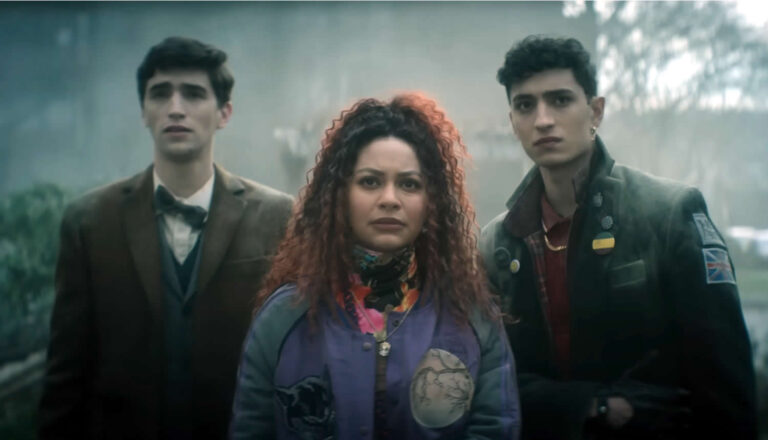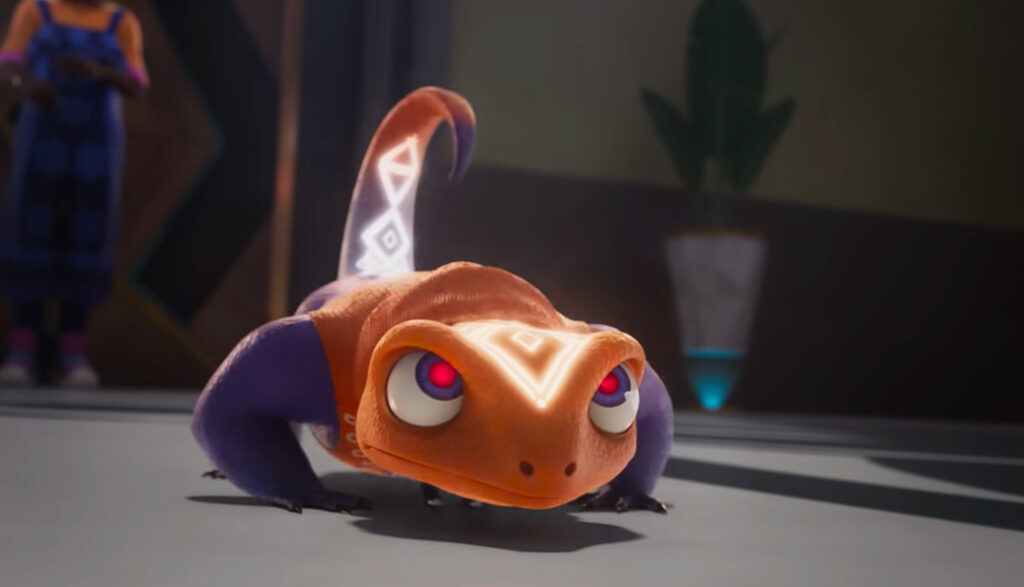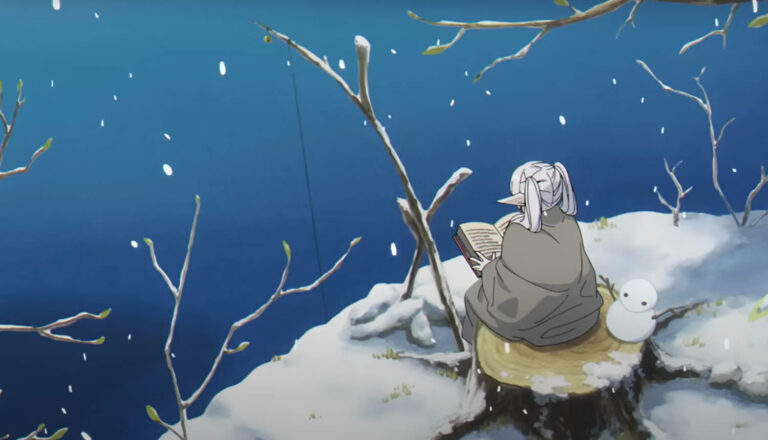
Dead Boy Detectives
Dead Boy Detectives targets teens in style and story. But it comes with very adult, problematic content.

The world everywhere is separated into haves and have-nots. But in this animated show’s futuristic version of Lagos, Nigeria, those divides are even more extreme.
Tola Martins has just turned 10. She lives on one of Lagos’ plush, pampered islands. The family chauffer can whisk Tola anywhere in the family’s flying car—as long as Tola’s father approves, of course. The cook can serve Tola the tastiest meals imaginable—as long as they have the requisite vitamin and fiber content. The Martins’ estate is lush and beautiful—good thing, given that Tola is rarely given permission to step outside.
Yes, Tola has just about everything a 10-year-old could want. Except for, maybe, a friend. A little bit of freedom. An engaged and interested father.
But she means to change all that—whether her daddy approves or not.
Tola’s dad, Tunde, isn’t entirely at fault for his disconnectedness. He’s working on a very important tech project that, he hopes, will keep the children of Lagos safe.
The city has been rocked by a series of kidnappings. Children are whisked away and held for ransom. And while they’re eventually returned unharmed, that hardly puts parents—or their bank accounts—at ease.
But Tunde, a high-tech security whiz, thinks he has the answer: a robotic security guard that looks for all the world like a charming little lizard. You’d not guess that if it detects a threat, the colorful reptile-bot can catch hurtling knives, knock bad guys out with his tongue and even transform into a terrifying mega-lizard.
Or it will. Once Tunde works out all the kinks.
For now, he’s given the prototype to Tola. She thinks it’s just a lizard. (And not being a fan of reptiles, Tola thinks it’s a dubious gift, too.) Tunde just wants to see how the lizard works in the field, as it were. Well, not that Tunde plans to test it out on any real bad guys, of course. After all, Tola’s still restricted to the family grounds, where it’s nice and safe and nothing can hurt her.
But Tola’s 10 now. She’s not going to just do everything that her dad tells her to do. “He can’t keep telling me to grow up and not even give me the chance to do it,” she tells Kole, a gardener on the property and her one-and-only, kinda-sorta friend.
So she convinces Kole to take her to the mainland of Lagos—a place of persistent hawkers, spicy food and real life.
But dangers lurk around every stall, hide behind every corner. The kidnappers are looking for rich children out of their element—and if they ‘nap Tola, she’d be their biggest, most important catch yet.
Disney’s entertainment juggernaut has been a bit wheezy as of late, what with a series of high-profile misfires and a shaky bottom line. With all that in mind, Iwájú feels like a paradox: It’s both a radical departure and, perhaps, a return to form.
The miniseries is touted as the Mouse House’s first “original, long-form animated series.” Moreover, it’s a partnership between Disney and Kugali Media, a British company founded by African artists. The company came to Disney’s attention when the team told the BBC it wanted to (and I’m paraphrasing here) beat Disney at its own game. Disney suggested a partnership instead, and all parties seem pleased to be able to tell a story rooted in Africa—and told by Africans themselves.
The show has more on its mind than mere entertainment. It focuses on inequality and class divisions—making Iwájú both more resonant (and a bit more preachy) than your typical animated diversion.
The characters come with important layers, too. Tola’s father is distant from his daughter and, often, dismissive of those who work for him. But he deeply loves Tola and is working like crazy on this project that could protect countless kids. The main evildoer here, Bode DeSousa, is a gangster out for cash. But we learn something of his backstory, and we’re given context to his rage directed at Lagos’ well-heeled elite. Kole is perhaps the show’s most compelling characters—pulled between Lagos’ two worlds.
And outside of moments of peril and mild violence, Iwájú seems quite clean at this early juncture, too: No profanity through the first three episodes. No lewd, winking asides. And while the bad guys are indeed bad, they feel as though they’d be right at home in a—well, in a classic Disney movie. (I have a feeling that Bode and The Rescuers’ Madame Medusa would get along famously.)
The show’s title, Iwájú, translates roughly to “the future” in the Yoruba language. This is certainly a futuristic tale, but perhaps it’s pointing to the future of Disney, too. And if that’s the case, the future could look a lot worse.
Tola—chauffeured by longtime servant “Uncle G”—goes to the airport to greet her returning father. It’s an exhilarating, and rare, trip to the mainland of Lagos. “Daddy says it’s dangerous,” she admits. “But you know me, I laugh in the face of danger.” But when a virtual hawker gets in her face and tries to sell her a fried lizard on a stick, she’s not laughing.
She’s not laughing after they get home, either, and her father immediately gets back to work. He ignores Tola’s birthday dress, shrugs off the tasty treats Tola cooked for her “birthday party.” He doesn’t even seem to see the hanging balloons that make it pretty obvious that it’s, y’know, her birthday.
Tola doesn’t know it yet, but bigger problems are on the horizon. Bad guy Bode was at the airport, too—using facial recognition to ferret out likely marks to target. Tola’s dad was using a sophisticated recognition blocking tool, but Tola was not. And if Bode can just figure out the little girl’s identity, he’ll have a lucrative pathway to find out who her dad is—and squeeze millions out of him.
In an opening sequence, we see what Tunde’s robotic lizard can do—sort of. In a virtual exercise, the lizard punches a would-be kidnapper with its tongue and knocks someone off a bridge. When the remaining villains take out virtual weapons, though, the lizard tries to transform into a huge beast—and fails, ending the simulation.
Tola steps on a lizard’s tail, which promptly pops off. Tunde scolds Tola for doing menial work. “Sometimes I think you act this way just to spite me,” he says.
Tola does her best to make friends with Kole, the boy who works as a gardener on Tola’s father’s estate. And when she knows that her father’s going to be working late (again), she invites the boy to stay for dinner. But father Tunde comes home earlier than expected, and he’s furious to find Kole and Tola sitting together at the dinner table: He essentially throws Kole out and scolds Tola for her kindness. “And you can forget about going to the mainland,” he tells her—withdrawing an offer he previously made.
Meanwhile, Bode, the kingpin behind the recent kidnappings plaguing Lagos, discovers Tola’s identity, and he begins to plot how to kidnap her.
In a flashback, we see a snippet from Bode’s past when he stole a gold chain from his mother’s wealthy employer. Bode’s mother begs him to apologize and give it back. “We need her,” she tells Bode. “Without her, we are finished.” The scene soon fast-forwards to the story’s present, where Bode continues to play with the same gold chain as some of his henchmen gamble and practice boxing.
Bode collects a ransom for another boy he has kidnapped—spreading the wealth to the rest of his gang. He rails against Lagos’ privileged few: “They use their money to take away the dignity of those around you,” he says. And he tells the boy—who’s about to be returned to his mother and father—that “to your parents you are just another problem to throw money at.”
Defying her father and tricking his chauffer, Tola talks Kole into escorting her to Lagos’ chaotic mainland. Little does she know that big bad Bode has asked Kole to bring Tola to him.
We learn some details about Kole’s impoverished life outside Tola’s palatial compound. His mother is sick, and they’re in debt to Bode. The gangster promises that Kole’s mother’s illness will be taken care of if Kole helps him. “Are you willing to choose this friend over her?” Bode asks.
But when Kole spends time with Tola in the frenetic city and sees how kind she is to Lagos’ more unfortunate residents, he tries to hustle her to safety.
Tola repeatedly hits a bad guy with her purse. Kole trips and wrestles with one of Bode’s henchmen while Tola runs away. Tola’s mechanical bodyguard lizard (which, you’ll recall, Tola doesn’t realize is anything but an ordinary reptile) perceives a knife-wielding fishmonger as a threat and yanks the knife away (with magnets) before the man can cut the head off a fish. We see Bode practice hitting a heavy punching bag. Tola says, “God don’ butter my bread,” and Kole laughs at her and her awkward pidgin English. A couple of people act very duplicitously.


Paul Asay has been part of the Plugged In staff since 2007, watching and reviewing roughly 15 quintillion movies and television shows. He’s written for a number of other publications, too, including Time, The Washington Post and Christianity Today. The author of several books, Paul loves to find spirituality in unexpected places, including popular entertainment, and he loves all things superhero. His vices include James Bond films, Mountain Dew and terrible B-grade movies. He’s married, has two children and a neurotic dog, runs marathons on occasion and hopes to someday own his own tuxedo. Feel free to follow him on Twitter @AsayPaul.

Dead Boy Detectives targets teens in style and story. But it comes with very adult, problematic content.

An elf mage contemplates on connection and regret as she watches her human friends grow old and pass away.